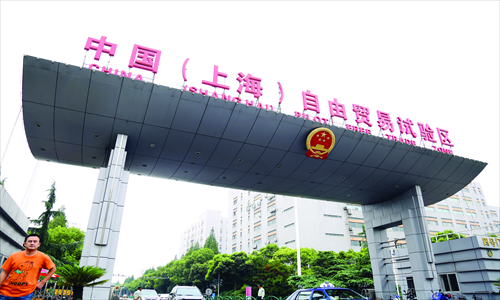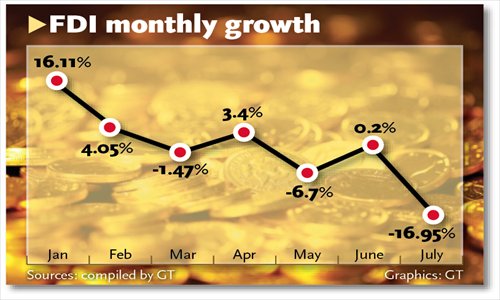EU urges China to push reforms
Market opening should be gradual, say Chinese experts

The entrance of China (Shanghai) Pilot Free Trade Zone. Photo: IC

A fairer system and better market access could fuel sustainable growth for China in a new era, even "after the current golden age of development ends," the European Union (EU) Chamber of Commerce in China said Tuesday.
But experts said that China still welcomes foreign investment and further opening-up needs to be done step by step.
"EU investment to China is not decreasing. It is just switched to a slower pace, caused by slower capacity expansion and increased difficulties in finding great projects to invest," chamber President Jörg Wuttke told a press conference to release the 14th edition of the chamber's Position Paper.
Member companies missed out on approximately 21.3 billion euros ($27.46 billion) in business opportunities due to "market access and regulatory barriers," which is equivalent of 15 percent of the EU's annual exports to China in 2013, according to Wuttke.
The chamber said key areas of concerns of its 1,800 member companies include the "dominant position" of the State sector backed by the Chinese government, and "protectionist inclinations."
In the first seven months of 2014, the world's second-largest economy received $71.14 billion in foreign investment, down 0.35 percent year-on-year.
However, a breakdown of the July data showed that foreign direct investment from Japan, the US and the EU dropped 45.4 percent, 17.4 percent and 17.5 percent, respectively, from that of the same period last year, data from the Ministry of Commerce released on August 18 showed.
"We don't' see a trend of EU companies moving out of the Chinese market, but there is a trend of less new companies coming into the market. And margins are turning out better elsewhere in the world. You also see more Chinese companies moving out of the market, building facilities outside China," Wuttke noted.
If China could implement reform resulting in an upgraded level of market opening and create a level playing field, the country has the opportunity to put in place a process akin to a domestic WTO accession that can reap great dividends, the paper said.
The Ministry of Commerce did not respond to request for comments from the Global Times by press time.
However, Chinese Vice Premier Wang Yang reiterated on Monday that the country will stick to its opening-up policy and continue to welcome foreign investment in a keynote speech at the International Investment Forum 2014 held in Xiamen, East China's Fujian Province.
The EU paper made suggestions to the Chinese government over policies across 28 industry sectors.
In banking, for instance, Wuttke said the share of foreign banks in China remains small - some 1.4 percent. In comparison, foreign banking accounted for 30 percent of market share in Indonesia, 20 percent in Brazil, and 5 percent in India.
He Weiwen, co-director of the China-US-EU Study Centre of the China Association for International Trade, said it's not that China has become reluctant to opening up to foreign companies - opening up the low-end manufacturing sector is easier than the high-end manufacturing and service sectors, which touches more nerves, He said.
"WTO principle offers no one-size-fits-all solution in deciding market access at the local level. Opening-up of these sectors [such as banking] involves much more diversified categories, and differing degrees of thresholds," he told the Global Times Tuesday.
"The comparison with other nations does not hold much relevance here. Market access must be treated and approached as case specific, and negotiations must be carried out according to the unique national conditions of China," He said.
Ding Chun, director of the Center for European Studies at Fudan University in Shanghai, agreed with He in that the decision concerning the opening-up of certain sectors must be made with reference to the development rhythm of China, which is still a developing country.
"A higher level of opening-up should be based on a step-by-step approach rather than an overnight one," Ding said.
Ding noted that not all sectors can be opened up.
"No country is opened-up completely. The US, for example, put constraints on Chinese telecommunication giant Huawei Technology on the excuses of national security, despite its highly open market status," Ding told the Global Times on Tuesday. "What's important is that China is striving forward [such as setting up the Shanghai free trade zone], and is on a right track."
However, a UN report released Tuesday indicated that FDI to China in 2013 topped $124 billion, making China the second-largest destination for foreign investment after the US.